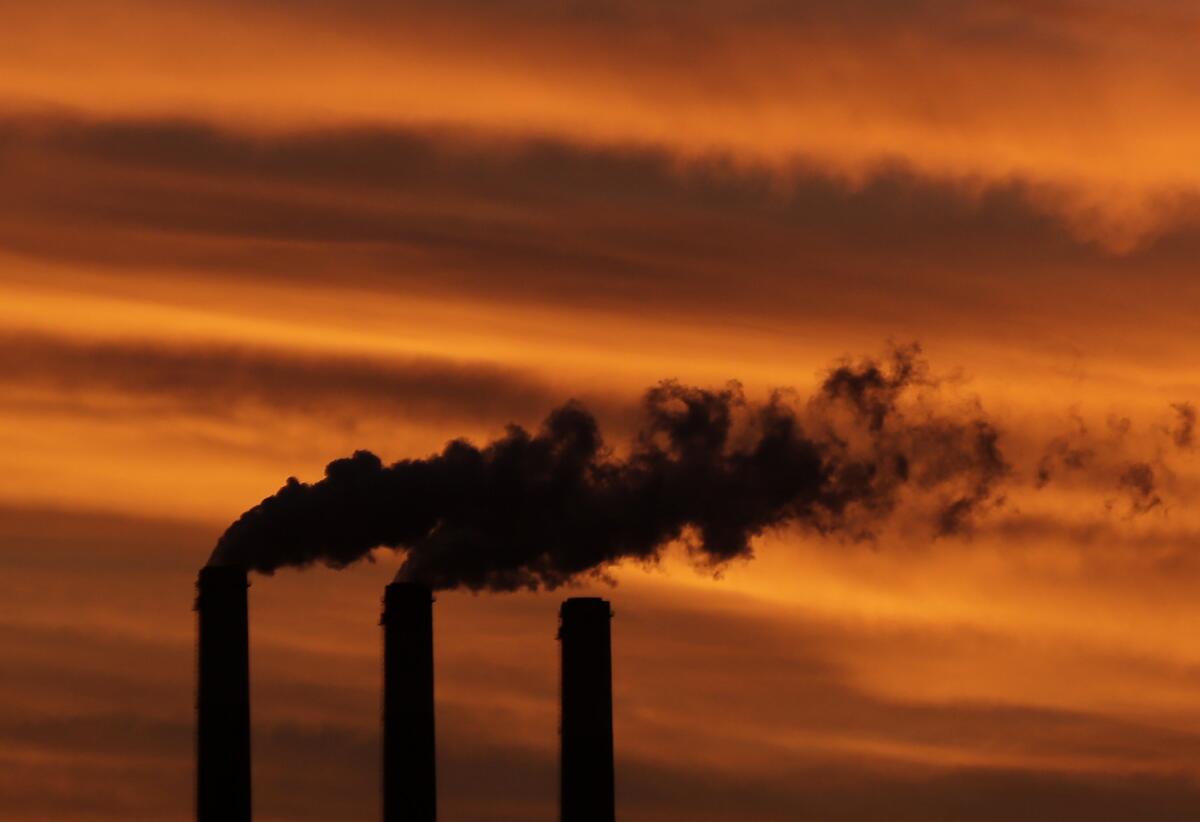Supreme Court rules for coal-producing states, limits EPA’s power to fight climate change

- Share via
WASHINGTON — The Supreme Court on Thursday ruled for the major coal-producing states and sharply limited the Biden administration’s authority to restrict the carbon pollution that is causing global warming.
The justices agreed with lawyers for West Virginia and said Congress did not give environmental regulators broad authority to reshape the system for producing electric power by switching from coal to natural gas, wind turbines and solar energy.
The court split 6 to 3 in the case of West Virginia vs. EPA.
Writing for the majority, Chief Justice John G. Roberts Jr. said Congress, and not the EPA, has the authority to make decisions on fighting climate change.
The Supreme Court upholds Biden’s broad power to repeal the Trump-era ‘Remain in Mexico’ policy.
“Capping carbon dioxide emissions at a level that will force a nationwide transition away from the use of coal to generate electricity may be a sensible solution to the crisis of the day,” he wrote. “But it is not plausible that Congress gave EPA the authority to adopt on its own such a regulatory scheme.... A decision of such magnitude and consequence rests with Congress itself, or an agency acting pursuant to a clear delegation from that representative body.”
Justice Elena Kagan wrote a scathing dissent, joined by the court’s two liberals, Justices Stephen G. Breyer and Sonia Sotomayor.
“Today, the court strips the Environmental Protection Agency (EPA) of the power Congress gave it to respond to the most pressing environmental challenge of our time,” Kagan wrote.
“Courts should be modest. Today, the court is not,” she said. “The court will not allow the Clean Air Act to work as Congress instructed. The court, rather than Congress, will decide how much regulation is too much. Whatever else this court may know about, it does not have a clue about how to address climate change. The court appoints itself — instead of Congress or the expert agency — the decisionmaker on climate policy. I cannot think of many things more frightening.”
The ruling appears to allow for regulations focused narrowly on controlling pollution from smokestacks but blocks broader rules that would set state-by-state targets for pollution and force a shift to other ways of producing electricity.
The case decided Thursday began during President Obama’s administration and the search for an effective way to combat climate change.
EPA officials focused on power plants, which are the largest source of greenhouse gases except for the transportation industry. They pointed to a provision in the Clean Air Act that called for reducing pollution through the “best system of emissions reduction.”
The word “system” could be read broadly, and in 2015, the agency proposed a regulation that would force states to change their system for producing electricity by switching from coal to other means.
But Roberts said that the “best system” clause meant the agency can seek to improve how power plants operate. He said it was far-fetched to conclude this little-known and rarely used provision gave the EPA the power to transform how electricity is produced.
The court’s five other conservatives agreed, ruling that EPA had overstepped its authority.
The outcome reflects the conservative court’s skepticism of federal regulation, particularly when it appears to go beyond what Congress specifically authorized.
West Virginia Atty. Gen. Patrick Morrisey called the ruling a “huge win for West Virginia and a huge victory against federal overreach and the excesses of the administrative state.”
Harvard law professor Richard Lazarus, an environmental law expert, called it “a major setback for the EPA’s ability to address climate change, and it could hardly come at a worse time.” The court is insisting on clear congressional action before approving climate change regulation when it “knows that Congress is effectively dysfunctional,” he said.
Senate Majority Leader Charles E. Schumer (D-N.Y.) slammed the conservative majority’s latest decision.
“First on gun safety, then on abortion and now on the environment — this MAGA, regressive, extremist Supreme Court is intent on setting America back decades, if not centuries,” he said.
Environmentalists have called for regulations to fight climate change, but for more than 20 years Republicans in Congress have steadily opposed new legislation on the issue.
They had one solid precedent on their side. In 2007, the court ruled that greenhouse gases were air pollutants subject to regulation under the Clean Air Act of the 1970s. That decision came on a 5-4 vote, with Roberts and Justices Clarence Thomas, Samuel A. Alito Jr. and the late Antonin Scalia in dissent.
Despite fears voiced earlier by environmentalists, Thursday’s decision does not overturn EPA’s authority to treat carbon emissions as a dangerous air pollutant. However, it restricts the agency’s authority to adopt broad regulations to combat climate-changing pollution.
While the ruling is a win for 17 Republican-controlled states aligned with West Virginia, environmental experts said it may not have a direct effect on California’s ambitious goals to eliminate its carbon footprint by 2045.
“Any time federal power to regulate climate change is constrained, state power gets more important,” said Cara Horowitz, co-executive director of the Emmett Institute on Climate Change and the Environment at UCLA School of Law. “California has always been a leader in the fight against climate change, and I expect that will continue and become even more crucial. States have a lot of regulatory power that this Supreme Court’s ruling does not touch.”
Horowitz said states will continue to determine the amount of renewable energy to power their grids. Perhaps most important for California, where the single largest source of carbon emissions is from on-road transportation, states will also wield the power to regulate vehicle emissions.
“Before the ruling came out, there was some concern that the court’s decision could threaten California’s waiver under the Clean Air Act, which lets California restrict greenhouse gas emissions from cars,” Horowitz said. “Because this case does not constrain EPA’s authority to regulate greenhouse gases from motor vehicles, at least not directly, I think there’s good reason to think that California’s auto emissions standards for climate pollution survive. That’s a big centerpiece of California’s climate program.”
In recent years, California has already witnessed record-setting heat, unprecedented wildfires and historic drought.
“The radical Supreme Court has weakened our country’s ability to prevent the climate crisis from becoming a catastrophe for our planet and everyone living on it,” said U.S. Rep. Nanette Diaz Barragán (D-San Pedro). “By sharply limiting the EPA’s authority to regulate greenhouse gas emissions from power plants, Americans will suffer from extreme weather events such as droughts, heat waves and storms. Rising temperatures and a delayed transition to cleaner sources of energy will threaten public health and reduce quality of life from increased air pollution. This burden will fall hardest on low-income communities and communities of color.”
“We are running out of time in the fight against climate change, and we need all levels of government working together to take action before it’s too late,” California Atty. Gen. Rob Bonta said. “In California, we have strong programs in place to address climate change, and we will not go backwards. We will continue to use all the tools we have to reduce emissions, fight climate change, and protect public health.
The Obama administration proposed its plan to strictly regulate power plants in 2015. States would have been required to reduce their pollution in the most effective way, including by switching from coal-fired power plants to using more solar and wind power. But in February 2016, a week before Scalia died, the court issued an order on a 5-4 vote that blocked Obama’s plan from taking effect.
The Trump administration then decided Obama’s plan exceeded the EPA’s authority. Several blue states sued to challenge that conclusion, and they won in the U.S. appeals court in Washington, which ruled the EPA could adopt broad regulations.
On taking office, the Biden administration said it would devise a new set of regulations to reduce pollution from power plants. But before it could do so, West Virginia and 18 other Republican-controlled states urged the Supreme Court to clarify the law.
Times staff writer Tony Briscoe in Los Angeles contributed to this report.
More to Read
Get the L.A. Times Politics newsletter
Deeply reported insights into legislation, politics and policy from Sacramento, Washington and beyond. In your inbox twice per week.
You may occasionally receive promotional content from the Los Angeles Times.











